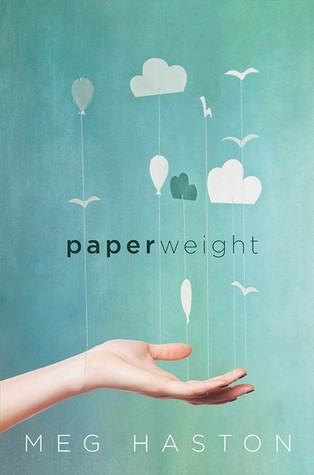Paperweight
by Meg Haston (Goodreads Author)
Seventeen-year-old Stevie is trapped. In her life. In her body. And now in an eating-disorder treatment center on the dusty outskirts of the New Mexico desert.
Life in the center is regimented and intrusive, a nightmare come true. Nurses and therapists watch Stevie at mealtime, accompany her to the bathroom, and challenge her to eat the foods she’s worked so hard to avoid.
Her dad has signed her up for sixty days of treatment. But what no one knows is that Stevie doesn't plan to stay that long. There are only twenty-seven days until the anniversary of her brother Josh’s death—the death she caused. And if Stevie gets her way, there are only twenty-seven days until she too will end her life.
In this emotionally haunting and beautifully written young adult debut, Meg Haston delves into the devastating impact of trauma and loss, while posing the question: Why are some consumed by their illness while others embark on a path toward recovery?
Life in the center is regimented and intrusive, a nightmare come true. Nurses and therapists watch Stevie at mealtime, accompany her to the bathroom, and challenge her to eat the foods she’s worked so hard to avoid.
Her dad has signed her up for sixty days of treatment. But what no one knows is that Stevie doesn't plan to stay that long. There are only twenty-seven days until the anniversary of her brother Josh’s death—the death she caused. And if Stevie gets her way, there are only twenty-seven days until she too will end her life.
In this emotionally haunting and beautifully written young adult debut, Meg Haston delves into the devastating impact of trauma and loss, while posing the question: Why are some consumed by their illness while others embark on a path toward recovery?
I’ve always been intrigued in anorexia nervosa, an interest initiated by Wintergirls by Laurie Halse Anderson. This mental disease that inflicts numerous people, especially teenage girls, seems to me such a fantastical yet real illness. How can people intentionally starve themselves to death while our primal instinct is to procure as much food as our body needs? Meg Haston tackles this mysterious disease in her novel Paperweight, accomplishing a feat with enough aplomb and gusto, but slightly lacking in finesse or greatness.
Why would I say that? It’s clear Haston tries to deal with too many issues at once. Abandonment issue, mommy issue, survivor’s guilt, anorexia, bulimia, just way too many psychological problems. It would have been better if Haston didn’t screw up her protagonist so thoroughly, and maybe the heroine’s recovery would’ve been more believable. The thing is, in the span of 28 days, the protagonist goes from full-on mental patient to an almost normal teenager. Unbelievable.
Stevie, the main character, arrives at an eating-disorder recovery center and begins a regimen of scheduled meals, snacks, group therapy, individual therapy, curfews, and bed checks (to make sure nobody escapes). She encounters a decidedly un-stereotypically cool therapist named Anna who sometimes pushes and sometimes waits for Stevie to reveal her thoughts. Stevie also has several anorexic or bulimic girls as roommates. Her father signed her up for sixty days, but only Stevie knows she’s not sticking around for that long. In 27 days, on the anniversary of her brother’s death, she will commit suicide. That’s the plan.
Really, Stevie is a perfectly adequate character. She’s mean and sulky most of the times, like any teenager with issues stacked ceiling high. For instance, she’s colossally wounded by the fact her heartless mother left her family for Paris and some rich partner. This also triggered her anorexia/bulimia because she mistakenly believes she’s not good enough for her mother. Moreover, she starts to act out and engage in heavy drinking with her questionable friend who uses her solely for entertainment. Her escapades ends tragically with the death of her dear, lovely brother, yet another thing Stevie blames herself for. Still, she can be gentle and kind towards her roommate when she discover just how damaged the other girl is. So, while Stevie isn’t so very good to the core, at least she’s real and doesn’t whine like all those “broken” rich white girls I’ve read about in “New Adult” and YA novels.
I like the therapist Anna, who is a pleasant surprise. She's nothing like the sympathetic shrink who sits behind a desk and nods to all your woes. She engages Stevie in genuine conversation and brings her out from her protective shell. Anna herself is not a postcard perfect person who's a blessing to all mankind; instead, she's a recovering alcoholic, something Stevie and the readers don't anticipate. This Shrink goes into the night searching for Stevie when she runs away and brings her back with more mercy than the heroine warrants. This is a character I like and would like to hear more about.
While Paperweight is an ED novel, it doesn’t focus so heavily on anorexia/bulimia. Sure, it talks a lot about NOT EATING and all that, but it’s less obsessive and manic than Wintergirls or even Unbearable Lightness. The count-down suicide is also less intense than My Heart and Other Black Holes. It’s not really Haston’s fault so many others have written great books about mental problems, but it is her fault her eyes are bigger than her stomach, resulting in a more or less scattered book. Overall, while Paperweight does have beautiful writing and emotional oomph and a totally gorgeous cover, it’s just not enough to blow people away.







Wonderful Review Grace!
ReplyDeletemimi | Book Fanatics
Thanks, Mimi. I'm glad you like it!
Delete